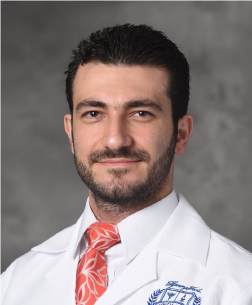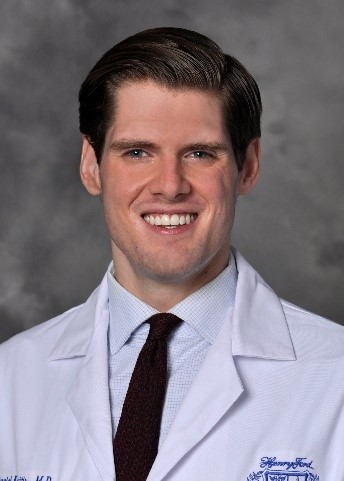|
A Different Kind of Education Current Henry Ford Health System residents share their experiences learning and practicing medicine when the coronavirus pandemic hit Southeast Michigan.
I was working on the general internal medicine floor when COVID-19 pandemic reached Detroit. It was tough, especially at the beginning, when we did not know much about the disease. We did not have answers to many questions, which made it complicated for us, our patients and their loved ones. This put more responsibility on our shoulders every time a patient looked up to us from his or her hospital bed. We were working together day and night to learn more about the disease, reading reports from all over the world and sharing all the new info we could gather to apply it in the clinical setting. I started feeling more and more involved. I volunteered for two weeks of nights in the Infectious Disease Unit, where I had the opportunity to learn more about the disease and touch more lives. And now, after we know more about the disease and after the curve started flattening, I look back and appreciate all the work that was done, I appreciate my colleagues, the leadership and the strong relationship we had that made us work as one mind and one hand for the benefit of our patients. -Elian Abou Asala, M.D., Internal Medicine. Dr. Asala is also an Alumni Representative to the Alumni Association.
The potential medical complexities of COVID-19 made all five of us initially apprehensive. It had been nearly a year since our last experience as medicine providers. We wondered if we could care for patients suffering from severe respiratory illness. We worried not only for our own health and safety, but also the health of our loved ones at home. Fortunately, the staff in the ED were grateful for our assistance and were extremely helpful in facilitating our adjustment back into the ED. Personal protective equipment was readily available, and we made sure to protect ourselves at all times. The majority of the patients that we saw were COVID-19 positive, with many of them requiring admission to the hospital and some form of respiratory support. However, we always kept a keen eye out for any ophthalmic complaint. Upon reflecting on our time in the ED, we have to commend Henry Ford on their response - we felt well-supported by staff and not overwhelmed by our duties, despite the crisis. We were dismissed from our redeployment as the surge in patients reached a downward trend. The five of us were eager to return to ophthalmology. We are grateful for the experience, and we will always have the memory of being on the frontlines during what is hopefully the worst pandemic of our lifetimes. Furthermore, we will be sure to carry with us the lessons we learned into our careers as ophthalmologists. -Daniel Kaitis, M.D., Ophthalmology. Dr. Kaitis is also Chair of House Staff Council. |
|
|

 We all know the COVID-19 experience has been challenging to all of us, and even more challenging to our patients and their families.
We all know the COVID-19 experience has been challenging to all of us, and even more challenging to our patients and their families. The first-year ophthalmology residents were redeployed to the emergency department during the first three weeks of Henry Ford Hospital's response to the COVID-19 pandemic.
The first-year ophthalmology residents were redeployed to the emergency department during the first three weeks of Henry Ford Hospital's response to the COVID-19 pandemic.